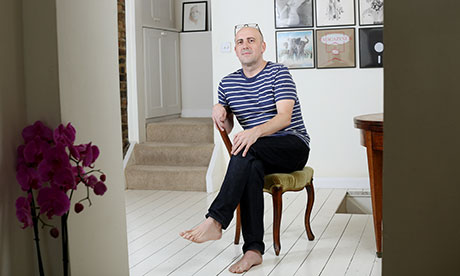
With the benefit of hindsight it is hard to believe that nobody noticed. My wife didn't seem to, although obviously she did. My friends didn't notice, but they were probably amused that a weight obssessive such as I had piled on so many pounds. And I certainly didn't. The truth of the matter was that my body had gone into shutdown. My brain was lost in a deep fog, life was percolating away from me. I was slowly – very slowly – dying.
And yet I didn't feel that I was. The year was 2000, my writing career was going well, and I was just about to become a father. Life was good.
But life was about to turn bad. Unknown to me, I was carrying a rogue gene. Its function is to trick the immune system into thinking that the thyroid gland is a foreign invader. This condition is known as Hashimoto's thyroiditis and probably affects one to 1.5 in 1,000 people.
The thyroid is a butterfly-shaped gland in the throat. It produces essential hormones known as triiodothyronine, or T3, and thyroxine, or T4. These are like petrol and oil: not enough and things start to rust, the engine starts to splutter and die. Hashimoto's causes our antibodies to attack the thyroid gland. Healthy tissue is slowly replaced by scar tissue, until the thyroid is unable to produce the required T3 and T4. Sufferers tend to faint quite a lot.
My symptoms began to show themselves over a period of 15 years. I fainted frequently, usually injuring myself in the process. First came the minor injuries: a cut on the forehead and chin; a broken nose; bruised ribs. Finally, third-degree burns on my back caused by collapsing against a hot radiator. In hospital none of the specialists thought to check for a thyroid condition. Why would they?
Equally, nobody I saw about my hip problem thought to check. Some years before I had slipped in the street ands hurt myself. This most minor of injuries simply refused to heal. Over the years I had x-rays, I had physio. Nothing could rid me of my limp. Eventually I was told that I had a condition known as avascular necrosis. Something had caused the blood supply to be cut off from my femur and the bone was dying. This is actually yet another symptom of a malfunctioning thyroid gland: the thyroid also produces another hormone known as calcitonin that regulates calcium production.
Likewise the seemingly ever-present colds that made life miserable were linked. My psoriasis, my debilitating joint and back pains, my dry hair and scaly skin, my trombone-like snoring, diarrhoea, bouts of depression and panic attacks, my insomnia, my terrible weight gain. My chronic fatigue. All of these problems came from that little gland in the neck.
Another symptom when one is hypothyroid is that it is impossible to concentrate. This meant that I was unable to write. I became expert at starting things and never finishing. My wife told me I had lost my "mojo" and she was right. I could only go through the motions. By 2012 I was a complete mess. My weight had ballooned, sleep was almost impossible. I limped continually and took powerful painkillers. I was drained of energy and motivation. I really was slowly dying.
People were talking about me. My mother-in-law was urging my wife to get me checked for diabetes. She gave me a long speech about the need to go for a "medical MOT". Then one day a friend looked at me and casually asked: "Have you had your thyroid checked?" It had never occurred to me to do this because I knew nothing about the thyroid.
I went for blood tests. When the thyroid gland is underactive yet another hormone comes into play. It is called TSH (thyroid stimulating hormone) and is produced by the brain. Its function is to regulate the production of T3 and T4 and its levels in the body indicate how much stimulation a person's thyroid requires to release the correct amount of these hormones. In a normal person the level of TSH in the body should be approximately 0.5-4.5. Mine was 99. After this reading, I was given some little white pills that I will have to take for the rest of my life. They synthetically replace the missing hormones. Magically, amazingly, things began to change.
Recovering hypothyroidism sufferers speak of the fog lifting, and so it was for me. I felt that I could suddenly think freely for the first time. The pain in my joints and back subsided. I began to sleep. I had energy. I smiled. There was colour in my cheeks. I lost 35lb in weight. I still limp, however.
More importantly, I can work again. I can write. And I have a decade's worth of catching up to do. I still have my bad days – sometimes the tiredness and the depression return. But I am pretty much the person I was before my problems began. It is just like starting over: I have to begin my career from scratch.
So what is the point of writing all this down? Steve Jobs once said that successful people "ship". By this, he meant that it is important that we finish what we start and actually deliver. This is me shipping. There will also be people out there who are going through what I experienced. Maybe they will read this and act. They should, because doctors never call you. You always have to call them.
Read more at ianprobertbooks.wordpress.com

